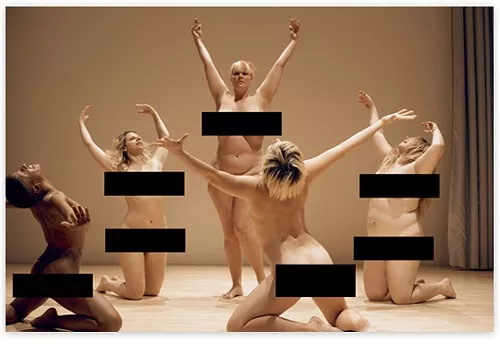Pretty gutsy of playwright Young Jean Lee to title this 2012 show as she did. On the one hand, you risk scaring away people afraid of the word “feminism,” or at least those who fear a harangue of some kind. On the other — given the kind of show it actually is — you risk ticking off people who expect a harangue of some kind.
Because whatever else it is, the world-touring Untitled Feminist Show — here courtesy of The Andy Warhol Museum’s Off the Wall series — isn’t what you’d expect. While it shares elements with some of Lee’s earlier work, it’s consistently fresh and unpredictable, starting with the fact that the six female performers are stark naked the whole one-hour show.

Part of Lee’s intent with this show is to allow women with vastly different body types to simply be themselves on stage, whether ironic coquette or burly street-fighter. And indeed, none of the women in the Pittsburgh staging, this past Saturday, has the sort of Hollywood- (or girlie-show-) normative figure we’d normally see naked in entertainment contexts.
And so the show’s form and function were largely one: The women’s simple acts on stage were the point, but that point was made with plenty of craft. Lee drew her cast (four of whose original six members performed here) from the worlds of dance, cabaret and burlesque. Each had her own considerable stage presence. Most also moved really well — especially important because the show has no dialogue (needless to say, another first for Lee).
The six women gave us a series of vignettes including: a childlike group frolic blended with a Grimm’s fairy tale; Malinda Ray Allen’s winsome pop-concert parody (with lyrics consisting entirely of “la-la”’s); and Amelia Zirin-Brown (a.k.a. Lady Rizo) pantomiming sex acts which gradually escalate to cheerful absurdity. (Think braided male progenitive organs.)
Other highlights included a bravura slow-motion fight sequence with two combatants and four onlookers taking sides — and the fight’s loser (Desiree Burch) encoring with an erotic dance. A few other set pieces, like a sort of dance to spring with pink parasols, felt like simple tributes to the joy of movement.
The show’s revue format, with a fair amount of direct-to-audience address by individual performers, was familiar from Lee’s The Shipment, a potent exploration of racism her company performed here last year.
Off the Wall has invited Lee most every year for the past several seasons. When she and her collaborators are firing on all cylinders, it’s easy to see why.

